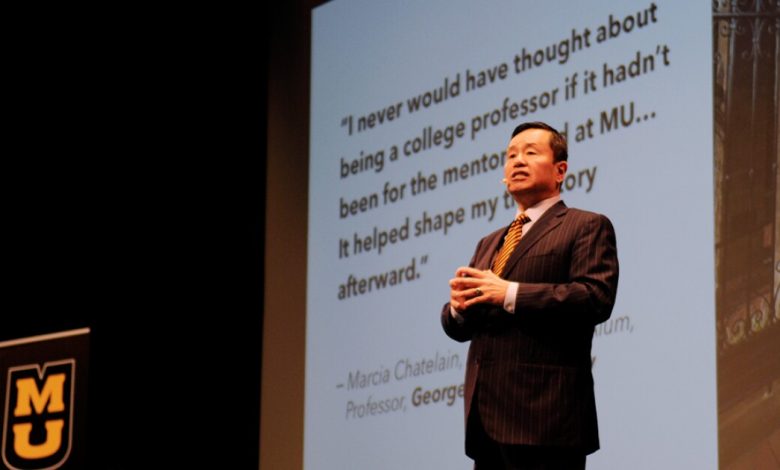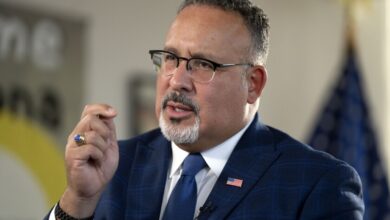This University President Is Focused on Performance and Productivity. That Worries the Faculty.

The University of Missouri’s system office used to have a staff of 10, including two vice presidents. Now only two people are left.
That’s been an intentional choice, to curb administrative costs, said Mun Y. Choi, president of the Missouri system and chancellor of its flagship, in Columbia. During a visit to The Chronicle‘s headquarters on Monday, Choi said the university reduced spending on administrators by 13 percent, totaling about $25 million between 2016 and 2021.
The administrative cost-cutting is part of a larger effort Choi said he is leading across the Missouri system to measure performance and investment return in every unit and department.
Choi noted that he’s not just making cuts. This month, he announced a $1.5-billion initiative called Mizzou Forward, which includes a faculty-recruitment push and $500 million in performance-based raises for faculty and staff members over the next five years. The system is also touting its NextGen Precision Health institute, an effort to improve health outcomes and access to care across the state.
But some faculty leaders have questions. Where is all that money coming from? Where is the money going? How are decisions about cuts being made? How is faculty performance being measured? Theodore Koditschek, president of Mizzou’s AAUP chapter and a professor emeritus of history, said in a phone interview that they haven’t yet gotten satisfactory answers.
Last month, 94 percent of voting faculty members at Mizzou approved a resolution saying that there was a crisis in shared governance on the campus. The faculty also passed a resolution calling for an end to a policy spearheaded by Choi that allows tenured professors’ salaries to be reduced by up to 25 percent.
Koditschek said the faculty have a deep lack of trust for the administration.
Choi said that he’s not going to rescind the pay-cut policy, but that there’s always room to improve shared governance. As a college leader, he sometimes has to make unpopular decisions based on the information he has. “My job is not to tally votes,” he said.
President and Chancellor
Some of the University of Missouri system’s administrative-spending cuts came from layoffs, buyouts, and eliminating programs. In other cases, when people left or retired, their positions were merged with other roles.
More than $2 million of the reduction, according to the university, comes from a decision in 2020 to give Choi a dual title as system president and chancellor of the flagship campus in Columbia. As a result, he said, the university no longer needed a system-level chief of staff, chief financial officer, or spokesperson.
The system used to have two vice presidents leading an office of research and academic affairs; Choi eliminated that. “Now we’re down to a director and an assistant,” he said.
The consolidation of the president and chancellor roles was panned by some faculty members who felt that Choi was making a power grab. Choi has denied that, saying the consolidation has actually given the Missouri system’s three other campuses more of a voice. In the past, he said, the Mizzou chancellor and the Missouri system president often disagreed on where investments should be made — causing conflicts that became a challenge when, for instance, lobbying the state legislature.
Other spending reductions came in IT. The Missouri system used to have a separate IT infrastructure for each of its four campuses, and four separate teams to maintain it; now there’s one unified IT contract with one team responsible for all campuses.
Choi said reducing administrative costs has helped win the good graces of state legislators. Republicans have for years pointed to administrative “bloat” when they’ve talked about what’s wrong with public higher education, saying they believe too many administrators are causing tuition increases.
When Choi’s tenure began five years ago, many Missouri lawmakers were upset with the way that former university leaders had handled racial-justice protests at Mizzou that drew international media attention. The lawmakers wanted to know, where is the leadership? Where is the accountability?
Choi said he has spent a lot of time rebuilding legislative relationships and emphasizing the big returns the university offers on investment. This year, he said, the University of Missouri system is getting its largest increase in state funding in more than three decades.
Koditschek said he’s all for curbing administrative bloat.
But the AAUP chapter president is concerned about reductions being made in areas — including some humanities and social-sciences departments — that are already stretched thin. Choi, Koditschek said, seems “really focused on finding things that he can cut.”
‘Reallocations’ and Tuition Increases
Choi said the $1.5-billion investment in Mizzou Forward is coming from two sources: $900 million in new revenue — including gradual tuition increases over the next 10 years — and $600 million in “reallocations.” When the time comes to distribute the $500 million in pay raises, chairs and deans will have to make a case for their employees, Choi said.
But Choi’s focus on performance and productivity is worrying some faculty members.
As the president-chancellor sees it, measuring performance isn’t particularly subjective. For faculty members, it mostly falls into the three core areas of teaching, research, and service.
For institutions that are part of the Association of American Universities, he said, research performance and scholarship are especially important, as is teaching prowess. The university wouldn’t rely exclusively on numerical student-evaluation ratings, he said, but he believes students’ comments are worth considering.
Choi has also moved to reduce the pay of some professors deemed less productive. The policy primarily applied to people at the School of Medicine, Choi said, where professors are expected to earn a portion of their salary through obtaining grants. But faculty members have feared that the policy could be expanded.
“My message has been, if a faculty member is getting paid 100 percent of their salary, we expect 100-percent effort,” Choi said. If they’re doing less research, he said, they can teach more or take on an administrative role.
Koditschek said he’s concerned that the administration is trying to use simple metrics to determine whether faculty members are productive. In some STEM fields, faculty members publish a lot of journal articles, often with multiple authors. In history, Koditschek said, publishing books — far less frequently — is more common.
“We’re not, in principle, opposed to having faculty judged on the basis of what they are actually doing,” he said. But he believes post-tenure review already accomplishes that.
The faculty’s resounding vote last month indicates that there’s a larger problem with shared governance, communication, and transparency at Mizzou, Koditschek said. While senior leaders come to faculty meetings, faculty leaders are not getting enough information about how decisions are being made, he said: “What we feel we’re getting frequently is infomercials.”
Choi said his main goals are to spend the university’s money effectively, reward the hardest-working faculty and staff members, and make sure the university can retain them.
Source link






